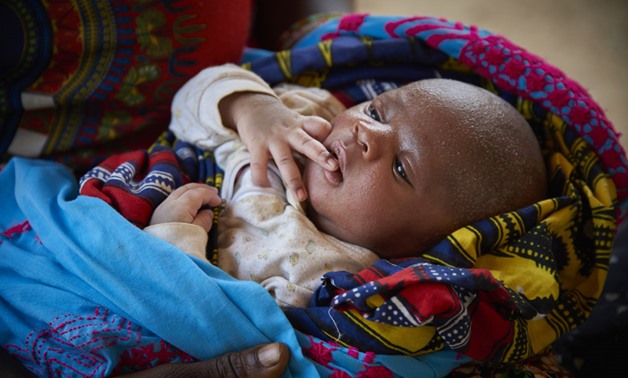
A Nine Day Old Baby Boy From Sierra Leone - Photo Credit UNICEF - Phelps
CAIRO – 21 October 2017: The United Nations (U.N.) Inter-agency Group for Child Mortality Estimation (IGME) published on Thursday the report “Levels and Trends in Child Mortality 2017”. It showed that the number of newborn deaths during the period from 2000 to 2016 jumped from 41 to 46 percent, or 7,000 babies, while 50 million children under five where saved during the same period.
The report also showed that every day in 2016, 15,000 children died before their fifth birthday, alarming that the current trends indicate that, between 2017 and 2030, about 30 million babies will die within the first 28 days of life.
Pneumonia and diarrhea topped the list of infectious diseases that claim the lives of millions of children under five across the world, accounting for 16 percent and eight percent of deaths, respectively. Pre-term birth complications and complications during child birth were the causes of 30 percent of newborn deaths in 2016.
The IGME report argues that many of these deaths are preventable through providing ready life-saving know-how and technologies, particularly in Southern Asia and sub-Saharan Africa, where neonatal deaths accounted for 39 percent and 38 percent, respectively. Five countries accounted for half of all newborn deaths: India, Pakistan, Nigeria, the Democratic Republic of the Congo and Ethiopia.
Moreover, simple, cost-effective interventions administrated before, during and immediately after birth can reduce mortality rates among newborns and their mothers. It also contributes to achieving the Sustainable Development Goal (SDG) targets on ending preventable childhood deaths.
In a joint press statement, members of the IGME expressed it is unconscionable that in 2017 pregnancy and child birth are still life-threatening conditions for women. “The best measure of success for universal health coverage is that every mother should not only be able to access health care easily, but that it should be quality, affordable care that will ensure a healthy and productive life for her children and family,” said Dr. Flavia Bustreo, the World Health Organization (WHO) assistant director for Family, Women’s and Children’s Health.
U.N. Children's Fund's (UNICEF) Chief of Health Stefan Swartling Peterson commented that the international community “has the knowledge and technologies that are required; we just need to take them where they are most needed.”
The IGME comprises of UNICEF, WHO, the World Bank and the Population Division in the U.N. Department for Economic and Social Affairs. It operates within the framework of the Global Strategy for Women’s, Children’s and Adolescents’ Health. The strategy is put into action by the Every Woman and Every Child initiative, launched in September 2010, to serve as a U.N. arm to mobilize and intensify international and national action by governments, multilaterals, the private sector and civil society to address the major health challenges facing women, children and adolescents around the world.

Comments
Leave a Comment